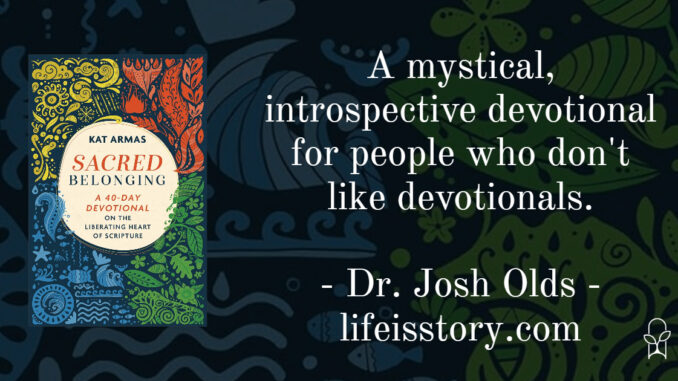
Also by this author: Abuelita Faith: What Women on the Margins Teach Us about Wisdom, Persistence, and Strength
Published by Brazos Press on September 12, 2023
Genres: Non-Fiction, Devotional
Buy on Amazon
Goodreads

In this forty-day devotional, Cuban American writer Kat Armas shows us that reading the Bible with fresh eyes allows us to experience God in new and liberating ways.
Many Christians today are seeking to disentangle biblical teaching from power structures that marginalize women and people of color. There's a hunger for a new kind of devotional that offers refreshing and relevant ways to connect with God and the Bible--ways that challenge readers to seek out a more liberated and embodied faith.
Drawing from personal narrative and Scripture, Armas highlights biblical passages that point toward decolonized themes centered on creation, wisdom, spirit, the body, and the feminine. Sacred Belonging helps us see how Scripture directs us to live a liberated faith, where we belong to God, the earth, and one another.
Sacred Belonging is a mystical, introspective devotional for people who don’t like devotionals. I’ve pretty much sworn off reading or utilizing most devotionals. They can be done well, but they’re overdone. Their brevity and compartmentalization of the biblical text, meant for easy and quick consumption, have a place in the Christian life but I dislike how central some have made it. Instead of reading Scripture, we find ourselves reading a curated and editorialized perspective on Scripture. Yet somehow, despite all those perspectives, many devotionals end up sounded all the same. Sacred Belonging sounds like no other devotional I’ve ever read.
I was first introduced to Kat Armas through her first book Abuelita Faith, an exploration of how voices on the margins have much to teach us about God. That theme continues in Sacred Belonging, as Armas attempts to disentangle Scripture from toxic power structures, offering a decolonized and often mystical reading of Scripture that is both thought-provoking and challenging.
Armas divides her forty-day devotional into five themes of eight devotions each. The five themes are 1) Creation, 2) Spirit, 3) The Body, 4) Wisdom, and 5) The Feminine. The result is a devotional that doesn’t feel quite cohesive from beginning to end. Armas never really explains how she came to these five themes, but they do all fit her personality and style of writing.
To give you an example of what a devotion is like, let me break down one of the devotions for you. On Day 17, Armas introduces readers to “A Disabled God.” This comes in the thematic section of The Body, where the devotions speak to the embodied-ness of faith. She contends that Western thinking typically reduces the body to something we have instead of something we are. I think that’s true in Eurocentric theology—a la a quote falsely attributed C.S. Lewis “You don’t have a soul. You are a soul. You have a body.”—but I don’t know that comports with Western secular thinking, which has no belief in an afterlife. Nonetheless, she’s correct in that most Western theology, with an emphasis on the afterlife and soulishness, have taken a low view of the physical body—which is borne out in their theology.
Countering this theology, Armas makes the point that Christ’s post-resurrection body is presented to the disciples as disabled. The body is not “perfect,” but holds the scars of the violence done to that body. Heaven is not an ableist utopia and neither should that be what our churches strive for. Rather, understanding God as disabled saves us from the idols of perfection and efficiency. The point is solid and clear, but the argumentation Sacred Belonging takes to get there feels like it needs more flesh than a four-page devotion can give it. Armas is bringing out some deep and heavy topics, ones unfamiliar to most of her audience, and while she does a good job the brevity of a devotional is an inherent limitation that may make her writing feel rushed or incomplete.
The connection to Scripture is also not always clear. While I dislike devotionals are basically selected commentaries, I also dislike devotionals where the Scripture selection seems like an afterthought. Sacred Belonging’s discussion of Scripture is thematically appropriate and clear, but occasionally lacks the amount of integration to the narrative that I would like to see. That’s totally a personal preference on my part.
Overall, Sacred Belonging will leave you wanting more and in a good way. Some of things that I appreciated about it were also sources of frustration. I loved how it leaned into the mystical aspects of faith. I also wanted it to have more clarity. I enjoyed that it brought depth and substance to a devotional; I was occasionally frustrated that it didn’t feel like enough despite the length constraints. I liked that it stretched my boundaries; it also had things that I didn’t quite agree with. And maybe that’s how it should be: a challenging, immersive, passionate, and personal work that drives readers just a little bit out of their comfort zones and into the arms of a God who is bigger, more inviting, and more inclusive than they’ve imagined.
